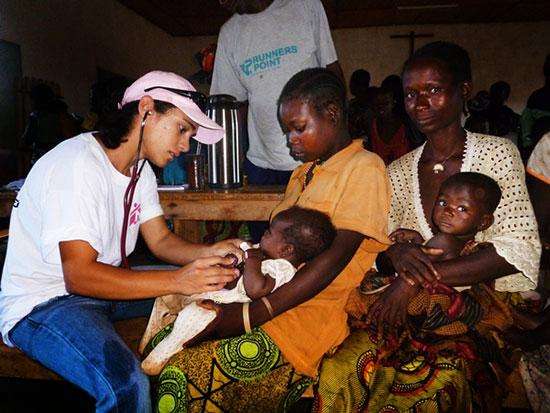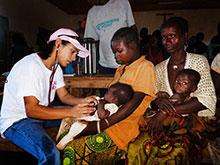Teams in Bouca Treat 26 Patients for Machete and Gunshot Wounds
MSF treated more than two dozen people injured in the aftermath of new violence 180 miles north of Bangui.
The medical humanitarian organization Doctors Without Borders/Médecins Sans Frontières (MSF) denounces the targeting of civilian populations in a new wave of violence that erupted recently in Bouca, roughly 180 miles north of Bangui, the capital of Central African Republic (CAR). In the immediate aftermath, MSF treated more than two dozen people who had been injured either by machetes or gunshots, including women and children.
A new wave of violence occurring in the Bouca and Bossangoa regions is causing even more suffering to civilians who have already endured months of conflict and repeated displacements. Over the past month, MSF projects in Bossangoa, Batangafo, and Paoua have all seen an increase in patients admitted to health facilities with injuries related to violence.
Fighting broke out in Bouca at around six in the morning on September 9, when armed men from a group purportedly supporting François Bozizé, the president who was ousted by the Séléka rebel group last spring, entered the village. MSF teams soon after treated 26 injured people, including eight women and six children, and transferred five people in critical condition to the hospital in Batangafo.
An undetermined number of people were killed in the attack. Some were apparently summarily executed. Houses were burned down as well. All of this leaves MSF deeply concerned that all parties to the fighting will continue to target civilians and carry out more atrocities against them. MSF is also extremely worried that inflammatory sectarian rhetoric that started during the Séléka rebellion in March could fuel more violence in the country.
“We are highly concerned about a further escalation in fighting and retaliatory acts of violence,” says Sylvain Groulx, coordinator of MSF’s projects in CAR.
Many of those who fled Bouca are hiding in the bush, and around 300 people are seeking refuge in a Catholic compound in the town. MSF plans to start mobile clinics to monitor their situation and that of those hiding in the bush. Of particular concern is the fact that this is the time of year when people are most vulnerable to contracting malaria.
There are concerns elsewhere, too. In nearby Bossangoa, MSF teams have received more than 25 machete and gunshot victims in the last two weeks. This sudden escalation of sectarian violence has heightened the atmosphere of fear within the communities, spurring thousands to flee in search of sanctuary. Attacks against health workers have occurred as well, and MSF strongly condemns the senseless killing of two humanitarian workers from ACTED last Saturday in Bossangoa.
“MSF denounces these horrific acts of violence against the population and calls on all parties to the conflict to respect the safety of non-combatants and medical and humanitarian aid workers,” states Groulx.
MSF is operating seven regular projects in CAR, while it has recently started emergency operations in four more locations. For the moment, MSF is maintaining its medical activities all around the country, both those that had been set up before the March coup d’Etat and those that were established in response to the acute needs of the population affected by displacement, high levels of malaria, and the collapse of the public health system in the country (including people suffering from diseases such as HIV/AIDS who are now cut off from their medication).





